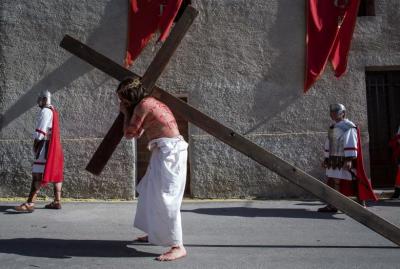The true meaning of Easter

Today is Good Friday, the day Jesus, the Son of God was crucified.
It is called “Good Friday” because it was followed by the Resurrection of Jesus that we celebrate every Easter Sunday morning. Without the Resurrection, the Crucifixion would have marked the saddest day in human history. It would have meant God’s plan to provide salvation for humanity would have been defeated. This glorious fact is, however, articulated by the wonderful Christian hymn.
Up from the grave He arose
With a mighty triumph o’er His foes.
He arose a victor from the dark domain,
And He lives forever with His saints to reign.
He arose, He arose!
Hallelujah, Christ arose.
Before the glory of Resurrection and the empty tomb, there was the agony of the crucifixion, a truly terrifying way to die. As the most famous verse in the Bible tells us, “For God so loved the world that He gave His only begotten Son to die a cross kind of death so that whosoever believeth in Him should not perish, but have eternal life” (cf. Jn. 3:16).
God’s plan for winning the victory over evil was announced just after Adam’s fall. In Genesis 3:15, God assures Adam, in what is known as the Protoevangelium or the “first Gospel,” that in the struggle between good (God) and evil (Satan), God and the people who follow Him will win and Satan and those who are his allies will lose.
The word “enmity” is much stronger than mere opposition, and signifies an epic struggle in which the “seed of the woman” would bruise the head of the serpent and in the process would have his heel bruised (a first prophecy of the virgin birth, the crucifixion, and the “empty tomb”).
God promised to send His Son and that advent of God into history came when the Word became flesh and dwelt among us (Jn. 1:14). At Christmas, we celebrate that advent, the birth of Jesus, our Savior. We have long had the tradition of giving each other gifts at Christmas. Why? We do so to acknowledge the greatest gift ever given, the birth of our Savior.
Christians who take their faith seriously understand that Christmas cannot be separated from Golgotha and the Resurrection. There was always the shadow of the Cross of Calvary over the Bethlehem manger. He was born to die for our sins and to purchase our redemption.
As the Old Testament system taught and as the New Testament declares in the book of Hebrews, “And almost all things are by the law purged with blood, and without shedding of blood is no remission” (Heb. 9:22).
To be our Savior and Lord, Jesus had to die. The conversation in the Garden of Gethsemane makes that clear. If there had been any other way to purchase mankind’s salvation without compromising God’s righteousness, God the perfect Father would have answered the perfect Son’s prayer and let the cup of death pass from Him.
And how do we know about the conversation in the Garden of Gethsemane between God and Jesus? The Apostles were all asleep. We know about it because Jesus told the Apostles. Why? Because it makes it clear that Jesus had to die. There was no other way to purchase salvation for mankind.
However, his death, while necessary, was not enough. Golgotha was required. Without the empty tomb and the resurrection, it would have been a tragic and meaningless death.
As the Apostle Paul told us in I Corinthians, if Christ had not been resurrected, our preaching is useless and so is our faith. But Jesus was resurrected. “O death, where is thy sting? O grave, where is thy victory?” (I Cor. 15:55).
Christmas is the beginning. Easter is the culmination — the joyous, happiest victorious ending. Jesus has conquered death for all who believe in Him and trust Him for their salvation. As our first Christian forebearers greeted one another in the first century: “He is risen! He is risen indeed!”
As I celebrate this Easter morning, the hymn that will be on my mind and in my heart will be one written by Charles Wesley, proclaiming the glories of God’s love and grace:
And can it be that I should gain an interest in the Savior’s blood?
Died he for me, who caused his pain, for me who Him to death pursued?
Amazing love, how can it be, that Thou my God shouldst die for me?
He left his Father’s throne above, so free, so infinite His grace,
Emptied Himself of all but love, and bled for Adam’s hapless race.
‘Tis mercy all, immense and free, for oh my God, it found out me.
No condemnation now I dread. Jesus and all in Him is mine.
Alive in Him, my living Head, and clothed in righteousness divine,
Bold I approach the eternal throne, and claim the crown through Christ my own.
Amazing love, how can it be that Thou my God shouldst die for me?
That is the true message and meaning of Easter — a love that was willing to come and die a cross kind of death that we might be liberated from sin and condemnation and be resurrected to newness of life and life everlasting.
Dr. Richard Land, BA (Princeton, magna cum laude); D.Phil. (Oxford); Th.M (New Orleans Seminary). Dr. Land served as President of Southern Evangelical Seminary from July 2013 until July 2021. Upon his retirement, he was honored as President Emeritus and he continues to serve as an Adjunct Professor of Theology & Ethics. Dr. Land previously served as President of the Southern Baptist Convention's Ethics & Religious Liberty Commission (1988-2013) where he was also honored as President Emeritus upon his retirement. Dr. Land has also served as an Executive Editor and columnist for The Christian Post since 2011.
Dr. Land explores many timely and critical topics in his daily radio feature, “Bringing Every Thought Captive,” and in his weekly column for CP.





















